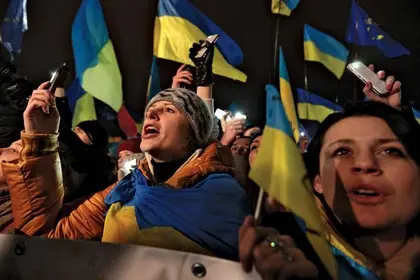On the other hand, they failed in their immediate aims: To force a special session of parliament on Nov. 27 and to convince President Viktor Yanukovych to change course once again and agree to sign the association agreement at the summit in Vilnius, Lithuania, that ends on Nov. 29.
Leaders of the EuroMaidan movement – a collection of opposition politicians, leaders of civic organizations and student groups, met on Nov. 28 and decided to ask people to stay on the streets at least one more day, and possibly into the weekend.
JOIN US ON TELEGRAM
Follow our coverage of the war on the @Kyivpost_official.
In Vilnius, one of three major opposition leaders, Arseniy Yatseniuk, said that “Maidan will go on in a different form.” He also said that he, along with the other two major opposition politicians – Vitali Klitschko and Oleh Tiahnybok – will form a single campaign headquarters and all contest in the first round of the 2015 presidential elections.
EuroMaidan leaders say they will consider the results of the summit in Vilnius and then collectively work out the details of the movement’s future actions.
Oleg Rybachuk, a public activist and leader of New Citizen public campaign, said that EuroMaidan will turn into a “massive watchdog” focused on putting pressure on the government to follow through with its initial promise to sign the association and free trade deal with the EU at a later date.
“We’ll be watching what the Ukrainian government does, and making sure it does what it has to do,” Rybachuk told the Kyiv Post from Shevchenko Park, where he was preparing to talk with some 2,500 student demonstrators.
He added, however, that smaller, more radical factions of EuroMaidan could organize themselves and storm government buildings. But the movement’s organizers would prefer peaceful, “more European” demonstrations. “We would like to see methods of civil disobedience,” he said.
Opposition politician Yuriy Lutsenko, one of the main organizers of the major rally on Nov. 24, told the Kyiv Post that EuroMaidan will end on Dec. 1, and that its future activity will be focused on peacefully removing the current government from power.
“On Sunday we plan (to march) from Shevchenko Park to Independence Square, where we will announce a joint formula of Yanukovych’s removal during presidential elections,” he said. Massive rallies will be scheduled for future months.
“On Nov. 24, some 100,000 people scared Berkut (riot police). The next rally should organize 500,000 people to show our force,” he said. “These rallies should grow big enough that on the day of the second round of presidential elections there will be no space for Berkut on the streets.”
Yevhen Ikhelzon, one of the organizers of We Europeans public campaign, also believes that EuroMaidan has not yet peaked. “It seems to me that it hasn’t even started,” he said.
Yegor Sobolev, a civic activist and coordinator of EuroMaidan, said that the movement has breathed new life into civil society. “Each of us represents a piece of EuroMaidan, on the level of our own house and yard,” Sobolev said.
Mass public demonstrations had been noticeably absent in the run-up to the Eastern Partnership Summit on Nov. 28-29 in Vilnius. Rybachuk told the Kyiv Post on Nov. 14 that Ukrainians weren’t ready to go to the streets. The expectation as that – with public opinion in favor of signing the political association and trade pacts with the EU – the government would follow through with its promise to do so. Other civic activists and nongovernmental organization leaders had similar remarks.
But all of that changed, instantly and spontaneously on Nov. 21 when, after years of negotiations, Ukraine’s government rejected the landmark deal with the EU just a week before the anticipated signing.
Rybachuk said the betrayal of government promises “brought people to the streets. It needed to come to this.”
The movement has so far failed to convince Yanukovych to sign the deal with the EU. In fact, Yanukovych and Prime Minister Mykola Azarov justified their decision as in the best interests of the nation.
Kateryna Medovnyk, a Kyiv Mohyla Academy student and active participant in the EuroMaidan demonstrations, remains optimistic. “There are a lot of us here, we can’t be ignored,” she said.
Young activists such as Medovnyk will help shape the movement and the country’s future, Ryabchuk said. “These students and young people are hyperactive. Student leaders can organize people, people who can be very effective in these rallies. I think that among them there will be new leaders with new approaches,” he said. “EuroMaidan has become a community which has a big future.”
Kyiv Post staff writer Oksana Grytsenko and editor Christopher J. Miller can be reached at grytsenko@kyivpost.com and miller@kyivpost.com, respectively. Kyiv Post deputy chief editor Katya Gorchinskaya contributed to this story from the Eastern Partnership Summit in Vilnius, Lithuania.
You can also highlight the text and press Ctrl + Enter




